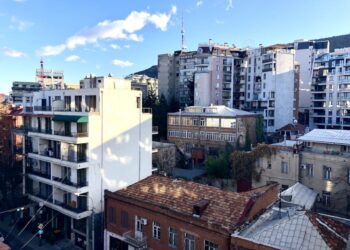In addition to the materialized results of sanctioning, there is another issue with an intangible connotation that should generally be looked at. This is the moral obstruction caused by the sanction, a kind of shaming of the sanctioned subject, in short, the stigma from the perspective of the audience.
The issue of moral categories in this regard is, of course, the subject of extensive discussion and includes many social, psychological and other aspects. However, within the framework of this article we would like to offer a couple of opinions on only one aspect, which is the creation of a crack in the political and business elite of an authoritarian country as a result of the sanctions and the fragmentation of the elites. Practically one o,f the goals of the sanctions policy, along with changing the target’s behavior with regard to the external course, is to distance its leadership from political and business support and, as a result, to loosen the unconditional control of the target’s leadership.
The manifestation of the same result is stigma as an assessment, which is socially fatal for the sanctioned system of governance because (theoretically!) it foretells serious harm, namely, the denial of critical public support within the country, and international isolation outside the country. Both, separately or together, lead to the collapse of the regime.
Clearly, this is only a theoretical part of this phenomenon, and how effective it will be in reality depends on the target’s perception of the “stinging effect” of stigma, as well as on how much it considers social norms and the category of reputation. Looking at Russia’s current political and military leadership, we can say that the answer to all the relevant questions is clear from the start and does not require further study of the topic.
As has been said, it is more about fragmenting the supporter base which should lead to effective change. As has been mentioned many times, it is one thing to deplete the target’s resources, but a second and much more difficult challenge is to normalize its behavior. Thus, to achieve the second task, creating a crack from within, the introduction of a social payment for business or other elites for relations with stigmatized leadership is one of the contributing steps. It should also necessarily be noted that this price has not only social content, it is directly linked to the refusal of the material, informational or human assets of elites.
It is evident that the stigma of sanctioning has so far had only a symbolic effect on Russian business and social elites. This is how it is seen, read and perceived from a distance. Naturally, the facts of having a firm civic position by individuals cannot have a decisive influence on this assessment. In Russia, even a process called “protest with one’s feet” – leaving the country – will not succeed as an acute protest. This, too, is a highly controversial, unambiguous event, to which we will probably devote a separate article.
To seize or not to seize?
Since the start of the war in Ukraine, a number of Russian assets have been arrested in various jurisdictions. In general, arrest is one of the popular tools of sanctions pressure. In such cases, generally, the arrest remains in effect until the goals of the sanctions are achieved or another decision is made by the initiator of the sanctions.
At the same time, this seemingly straightforward legal action has given rise to several legally problematic nuances.
For example, it has become necessary to identify the criminal nature of the origin of arrested property, to justify this connection. In the current circumstances, this is not always possible: not only because of practical difficulties, but also because of inadequate legislation in some places. We are talking about the receipt, accumulation and possession of property in violation of international sanctions, say, through a cross-border covert operation or through a criminal offense.
The issue became even more topical and acute when it came to the confiscation of frozen assets.
Additional sensitivity arose when the West initiated a discussion about directing confiscated Russian assets to rebuild Ukraine’s infrastructure. The aforementioned criminal background check has become much more demanding and often difficult to overcome. And the actions of individual countries, such as Estonia or Canada, could not bring legal clarity to the confiscation of frozen property under sanctions.
There is another risk associated with the seizure of Russian assets without proper evidence: retaliatory steps by Russia against Western assets. Obviously, with the Russian Federation’s disrespect for international norms, this risk already exists. However, it is also a fact that any arbitrary legal action by the West will significantly lower the “bar” of imperative legal requirements for asset confiscation by Russia.
Thus, it is one thing to arrest an asset and another thing to seize it from the owner. Even in the context of developed Western law, the former is relatively less complicated challenge, while the latter is associated with a significant legal problem – the quality of the burden of proof. For example, current sanctions legislation in the United Kingdom has revealed a number of practical flaws in terms of the impregnability of identifying the assets of Russian public officials under the so-called “corporate guise”. And in the United States, the granting of a high degree of discretion with respect to asset forfeiture has divided opinion among scholars and practitioners. Some of them still argue that in the current legal environment, confiscation of property without a standard of good cause can be considered a violation of the constitutional principle of “due legal process.” It was also suggested that in a number of cases, especially in connection with privately owned property, it would be difficult for Western agencies to firmly establish the criminal origin of property without communication with the relevant authorities of the Russian Federation.
Another problem directly related to this topic comes from existing bilateral and multilateral international agreements with the Russian Federation, especially with regard to the resolution of investment or commercial disputes by arbitration. And here the member states of the Western coalition have a choice between a relatively “aggressive” and a relatively “moderate” approach. And the final answer to the legality and validity of one or the other approach should be sought in future arbitral awards.
We also wish to note that the answer to all possible scenarios in connection with the immunity of state assets in international law has not yet been developed. And although there seems to be a common understanding of “sovereign immunity,” an exhaustive view has not been created of all cases of the “sovereign immunity” exceptions, where one state can arrest the assets of another state without any legal risk. The effect of Western sanctions against Russia is expected to enrich and add much in this regard to a better understanding of the scope of “immunity”.
Thus, in the case of a judicial appeal, there is a risk of overturning a legally unsubstantiated act of confiscation by imposing compensation on the implementing party. Legislative and judicial practice will probably take care to minimize such risks. However, much greater clarity and better reasoning around the problem will be possible as a result of specific judicial proceedings.
The universality of the sanction?
Economic sanctions have taken a firm place among the main means of achieving foreign policy goals. Moreover, given the growing trend of their use, they have become almost a universal “geo-receipt”. Here it should also be noted that the United States of America, as the main determinant of fashion in sanctions policy, is characterized by a particular propensity for economic coercion measures. It is enough to cite just some data to substantiate this assertion. For example, during President Obama’s first term, the United States imposed sanctions on an average of 500 entities per year, and during Trump’s presidency this number has almost doubled.
However, as mentioned above, statistics are statistics, and the effectiveness of economic sanctions in the geopolitical arena is associated with a number of challenges and problematic issues in its use as a so-called “means of broad domestic consumption”. In previous publications, we have repeatedly mentioned that, based on authoritative sources, the sanctions policy worked only in a third of cases. Objectivity requires us to add that the last such systematic study was conducted by the University of North Carolina in 2014 and, in all likelihood, the data would have changed somewhat since then.
As a summary
The practice of Western sanctions in response to Russia’s renewed invasion of Ukraine has given new perspective to the debate on this issue and raised a number of additional questions.
One of the main questions is whether the idea that economic sanctions will always serve as an adequate substitute for military or diplomatic means is valid. It is clear that there are many crises for which the military route is ineffective and the diplomatic solution is accompanied by a sense of scarcity. But does economic sanction fully cover what both of these methods fail to do?
Thus, in contrast to the “broad domestic” use of sanctions policy, we should once again note the need for its selective application in a “sparing” mode. It should be additionally recalled that in order to be targeted and effective, an acceptable decision on economic coercion should be precisely adapted to the task at hand; and specific steps should have specialized content and be taken together with the implementation of other possible measures in a complex.
Let us once again draw attention to the requirement for a clear understanding of the full cycle of economic sanctions – all phases: from the motives for their introduction to the conditions for the removal of sanctions. In addition, in order to choose a measure of economic coercion, it is advisable to conduct a full stress test for its deterrent effect, as well as to analyze the expected consequences on one’s own economy in order to reduce their negative impact.
There is another circumstance related to sanctions, which was particularly evident in the context of the war in Ukraine: in parallel with the imposition of economic sanctions on the target by the initiator, it is easy to inflict some economic damage on the systems of allied and partner countries. It is also difficult to define coercive measures in terms of their content, duration and scale so as not to antagonize allies or supporters. Here it should be said again that “scale” does not always equal “effectiveness” and that the specific questions – What? For what? How? – also require specificity of actions, which boils down to mechanics.
In short, issues related to economic sanctions cannot be subjected to a precise theoretical definition or static assessment. This is not surprising, since the world economic structure is thoroughly transforming before our eyes, modern technology is developing rapidly, the texture of societal and social relations is changing, resulting in the formation of a new operational code of geopolitical behavior, of which the geoeconomic component is an integral and organic part. Therefore, there is an obvious need for constant observation, assessment and harmonization of economic sanctions and their transformative nature, including in Georgian political and research circles. Along with academic interest, the study of the sanctions problem has a practical load: it helps to better understand a world in which our country’s coexistence with others is characterized by a significant increase in competition and selfishness in international relations.
Analysis by Victor Kipiani, Geocase Chairman














